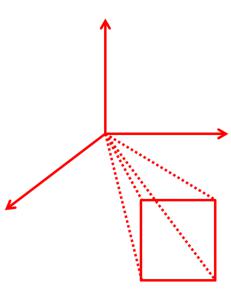 This weekend, I preached on Ephesians 3:14-21, which talks about the “height, length, width, and depth of God’s love.” I have no idea what Paul actually had in mind with these terms (neither do any of the commentaries), but it gave me an opportunity to be creative in talking about different aspects of God’s love according to geometric dimensions. I decided that I would interpret the “depth” of God’s love as the way in which God zeroes in on every detail of creation with infinite intensity, which is what I tried to capture in the diagram to the left. I found scriptures that talked about each of these four dimensions of God’s love. And I explained why this love requires the cross of Jesus Christ in order to perfectly fulfill itself.
This weekend, I preached on Ephesians 3:14-21, which talks about the “height, length, width, and depth of God’s love.” I have no idea what Paul actually had in mind with these terms (neither do any of the commentaries), but it gave me an opportunity to be creative in talking about different aspects of God’s love according to geometric dimensions. I decided that I would interpret the “depth” of God’s love as the way in which God zeroes in on every detail of creation with infinite intensity, which is what I tried to capture in the diagram to the left. I found scriptures that talked about each of these four dimensions of God’s love. And I explained why this love requires the cross of Jesus Christ in order to perfectly fulfill itself.
I. What is the height of God’s love?
(A) As tall as the distance from heaven to Earth (Philippians 2:5-11)
The first way to describe the height of God’s love is as the distance from the throne of God in heaven to the lowliest point on the Earth that He created. Philippians 2:5-11 describes how Jesus traversed this distance by “becoming nothing” even though He was “God by nature.” Jesus’ birth in a manger and death on a cross represent the very bottom of society. Because Jesus lived on the bottom of society, nobody could think of themselves as beneath God’s love.
(B) As short as the smallest child (Mark 10:13-16)
When Jesus’ disciples try to prevent the children from coming to him in the famous story from Mark 10:13-16, he rebukes them saying that not only does the kingdom of heaven belong to children but you have to become like a child to enter into it. It is not just that God’s love reaches down the entire height from heaven to Earth to the lowliest of people. We also must stoop down ourselves to experience it fully. It is something that fills the world from the bottom up.
II. What is the length of God’s love?
(A) From before we were born… (Psalm 139:13-16)
Psalm 139 is a great psalm for capturing the dimensions of God’s love. The psalmist talks in these verses about God knows us before we are born and puts us together in our mother’s womb. It’s essential to understand that God loves us long before we are capable of loving Him or having any awareness of His love. Some people think that God starts loving us only after we go through some kind of ritual or make some kind of decision to “let Him into our hearts.” The only reason we’re even capable of making a decision to receive God’s love is because God loved us before we loved Him.
(B) To forever and ever (Psalm 136, Romans 8:38-39)
Psalm 136 has a great refrain that has been made into a contemporary praise song: “His steadfast love endures forever.” God’s love indeed endures forever. God never stops loving us, even when we reject His love. This is the point expressed in Romans 8:38-39 as well. Nothing can separate us from the love of God, not even death. What Romans 8:38-39 says to me is that God loves even people who have chosen hell over communion with Him. Whatever hell is, it does mean that God’s love has finally come to a stop for some people.
III. What is the width of God’s love?
(A) Wider than anywhere we could flee (Psalm 139:7-12)
Psalm 139 asks, “Where can I go to flee from your presence?” The answer: nowhere! There is nowhere outside of God’s love. If we resist it, God won’t force it on us, but it’s always there calling us. There is no escape from that still, small voice and the agonizing feeling that we have when we’re running away from God. As Augustine says, “Our hearts are restless until they rest in you.”
(B) As wide as the whole human family (Ephesians 3:14, 1 Timothy 2:3-4, Romans 11:25-32)
The other aspect of the width of God’s love that we could describe is that it covers the whole human family. We see this in Ephesians 3:14, which says that every family on heaven and earth gets its name from their heavenly father. It’s important to point out that the idea of God as a father of humanity is not a universal concept across religions. Based on what I’ve studied, it’s pretty unique to Christianity to think of all humanity as children of a heavenly father. 1 Timothy 2:3-4 talks about God’s desire for “all people to be saved and come to a knowledge of the truth.” God wants everybody to be at His eternal party. We see this also in the parable Jesus tells about the great heavenly banquet in which the host gets dissed by his rich friends so he invites all the beggars and lepers off the street to come instead. Romans 11:25-32 describes how the rejection of Jesus by the Jewish authorities was providential because it provided the means for God to spread His love to the Gentiles. If Jesus had been accepted as a messiah by His people, then He couldn’t have been the savior of the world. Romans 11:32 is a very profound statement that I’m still trying to figure out: “He has bound all to disobedience so that He might have mercy on all.” God’s goal is to bring all of us under the reign of His mercy.
IV. What is the depth of God’s love?
(A) Deeper than we want it to go (Psalm 139:1-6)
The height, and length, and width of God’s love are the easy part of it because they have to do with God’s unconditional acceptance of everyone. The depth of God’s love is what makes it intolerable and something we want to run away from. Psalm 139:1-6 describes the radical intimacy that God has with each of His creatures. He knows every detail of what we do, even details that we don’t know ourselves.
With the Enlightenment, a view of God as a disinterested “watchmaker” became popular. The thinking was that if God represents perfect objectivity and absolute truth, He must be completely aloof to creation in order not to be biased in favor of one person over another. But this view of objectivity is the opposite of God. God is infinitely subjective. He is radically devoted to the well-being of every single one of His creatures. He has gifted each of us and made a plan for each of us. When we blow off God’s will for our lives, it is very hurtful to Him.
God is like the worst of Little League parents. Every time we have the tiniest moral victory, He whoops and throws His hat up in the air. Every time we betray His love, He yells and slams His hat down on the ground. His love is searing hot and fierce. It is not just accepting; it is infinitely demanding and exacting. It is very uncomfortable to stand in the presence of God for this reason, which is why we distract ourselves with all kinds of idolatry and worldly pursuits to avoid the terror of solitude with our Creator.
(B) Deep enough to make us perfectly clean (Hebrews 9:11-14)
God’s love is too intense for us to handle without assurance of His acceptance and forgiveness. That’s what Jesus sacrifice provides for us. I discussed the work of the sacrifice in my sermon two weeks ago. The book of Hebrews explains it very well. We need a cleanliness that is far deeper than the cleanliness of anti-bacterial soap. We carry real spiritual gunk around with us that requires the blood of Jesus’ sacrifice to absorb it and take it away. I can’t explain how this happens, but I know that it has happened for me and I know that Jesus’ sacrifice is the deepest expression of God’s love.
So how do these different aspects of God work together when confronted by real-life tragedies?
God loves this man infinitely and wants to spend eternity with him.
God also loves these twelve people infinitely and wants to spend eternity with them too.
This is where God’s love doesn’t make any sense. How in the world can a God who burns with rage at the evil that was committed against each of these twelve people that He loves also love the murderer who committed that evil? How can God create the circumstances by which a murderer and His victims could sit around a heavenly banquet feast together?
Only a crucified God can take the hand of a perpetrator of evil in His left hand and the hand of a victim of evil in His right hand and bring them together in His crucified flesh. Jesus’ cross makes communion possible between victims and perpetrators of evil. Usually the lines aren’t as clear-cut as they were in the Colorado shooting. All of us are both victims and perpetrators. It is impossible to untangle the evil we’ve caused from the evil we’ve suffered, so Jesus takes on all of the harm we’ve suffered and all the guilt we have for causing others’ suffering so that we can have peace with one another. The cross makes it possible for God’s love to cover everybody without compromising its depth for anybody and for us to live together inside of that love whose power can do “far more than we could ask for or imagine.”











